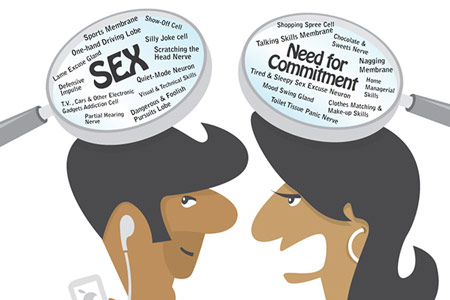How Men And Women View Infidelity Differently
 Infidelity is only one thig; conducting a romantic relationship with someone other than who you are committed too. While the definition is amazingly simple, it gets drastically twisted when it comes to how the two sexes see it differently. There is even some scientific data to support this statement and you will be surprised at the evidence. Men are more likely to feel anger and hurt when confronted with infidelity than women. Specifically, Men are more hurt by sexual infidelity while women are pained most by emotional infidelity. The survey was taken in 2007 by people of every sexual orientation who visited MSNBC. Almost 67 thousand people participated. They were asked questions about how different sexual and infidelity situations would make them feel. Participants had two options to choose which would make them more upset or distressed. The two options were used to determine if sex without emotion or emotion without sex felt worse to each participant.
Infidelity is only one thig; conducting a romantic relationship with someone other than who you are committed too. While the definition is amazingly simple, it gets drastically twisted when it comes to how the two sexes see it differently. There is even some scientific data to support this statement and you will be surprised at the evidence. Men are more likely to feel anger and hurt when confronted with infidelity than women. Specifically, Men are more hurt by sexual infidelity while women are pained most by emotional infidelity. The survey was taken in 2007 by people of every sexual orientation who visited MSNBC. Almost 67 thousand people participated. They were asked questions about how different sexual and infidelity situations would make them feel. Participants had two options to choose which would make them more upset or distressed. The two options were used to determine if sex without emotion or emotion without sex felt worse to each participant.
Man Are Hurt By Sex While Women Fear Love
Strangely enough, heterosexual men were far more hurt by actual sex in an infidelity than women. What really bothers women is falling in love with someone else, without having sex. That emotional connection means something to them. It feels more like a betrayal if it is an emotional, mental experience. Whereas sex is something that you can do and forget about. This difference gives us a small glimpse into the inner workings of a woman’s mind. A deeper connection than just a sexual experience is what means most to them. Some theorists say that this is ingrained in female DNA because it may threaten the future of a woman’s offspring. Men fear the sex act itself most. The thought of their woman having sex with another man is almost too much to bare for most men. Emotions are intangible, invisible things. The act of sex is a real action that brings two people together in the most intimate of ways. Something special is shared no matter how long the relationship continues. It is often a deal breaker for a man. This is because of their evolutionary station, another man taking his mate is a bad sign. It triggers deep seated emotional anxiety.
There are some things to keep in mind about the study, however. The scientists who conducted the research and study admitted that there are several factors that affect the study outcome. Social stimulus, environment, and familial relationships can manipulate the evolutionary mental system and alter a person’s reactionary thoughts. Another point researchers made was that men take an affair more like a stubbed toe. It is extremely painful but nothing that can’t be healed. While women, on the other hand, look at it as a more and long lasting break. This may be due to the fact that a woman is genetically programmed to think about her future, her kid’s future, finances, food, shelter, etc.
It May Just Come Down To Paternal Uncertainty
Some theorists believe it all boils down to one simple thing – paternal uncertainty. It may not even be how we think anymore, necessarily, but your gut reaction to cheating is going to come from the evolutionary predomination. For men, they don’t want to waste their time, energy, youth, and resources raising children that don’t belong to him and will not progress his gene line. For women, they are desperately afraid of becoming a mother with no one to help her. From nine months of virtual incapacitation to many months and years of varying degrees of hardship, an affair is really going to make a woman wig out.
Men & Woman Alike Both Get Angered By An Affair
The study proved one thing; everyone gets pissed over an affair. Except swingers and the polyamorous. Learn how swingers works here. They don’t mind so much. Everyone else? Mad as heck and hurt. The only thing different is how most people in their sex deal with it. Don’t forget the occasional oddball who doesn’t go with the norm. The female who finds the sex act more emotionally damaging or the guy who hates the emotional connection. The study points out that men were 54% more probable to become upset over sexual infidelity versus 35% of females. Another important statistic brought in by the study was the likelihood of experiencing infidelity during the course of a relationship was about 6% per year. It is 25% likely over the course of an entire relationship.
To use this information to your advantage, remember that cheating hurts no matter who you are. When dealing with infidelity in your own relationship, remember that the cheating may not be the real problem. There are more than likely other problems in the relationship. The infidelity is simply a symptom of deeper issues in most cases. Just like most things in life, men and women see things basically the same but with some minor tweaks.
Sorry, comments for this entry are closed at this time.